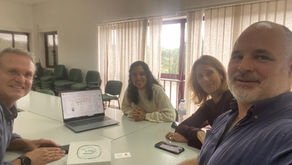
Every year, the Board conducts an evaluation of a pipeline of impact and research projects submitted by innovative organizations focusing on the Sustainable Development Goals (SDGs) 14 (Life Below Water), 6 (Clean Water and Sanitation), 4 (Quality Education), and 3 (Good Health and Well-being).
The Foundation provides grants to evidence-based organizations working towards these goals.

GRANTS.
IMPACT INVESTMENT PROJECTS IN 2022/2023.
EVIDENCE ACTION's
DISPENSERS FOR SAFE WATER PROGRAM
Dispensers for Safe Water distributes chlorine dispensers in low-income communities to treat water so that it’s safe to drink.
Dispensers for Safe Water targets impoverished rural communities lacking access to safe drinking water, focusing on Sub-Saharan Africa. Children under five are a key focus, as diarrheal disease is the second-leading cause of death in this age group. The program serves rural areas in Kenya, Uganda, and Malawi, where 67%, 55%, and 58.1% of the population, respectively, live below the poverty line, earning less than USD $1.90 (€2.00) per day (Sources: KNBS, UNICEF, IFPRI).
With the support of FAM Impact investment in 2023, the organization significantly expanded its reach, doubling its footprint with over 52,000 chlorine dispensers now actively used by 10% of Uganda's population and 15% of Malawi's population. This success is driven by dedicated promoters who engage directly with households, promoting the use of chlorine dispensers and managing day-to-day operations, resulting in a high user adoption rate of 60%.


The "Dispensers for Safe Water" project mostly contributes to the targets of SDG 6 and SDG 3 by providing safe, affordable drinking water and improving water quality in rural Sub-Saharan Africa. This effort reduces waterborne diseases, enhances public health, and lowers child mortality rates, particularly for children under five. Additionally, it engages local communities in sustainable water and sanitation management, contributing to the long-term sustainability of water resources and overall well-being.



The "River Project" contributes mostly to SDG 6 (Clean Water and Sanitation), SDG 4 (Quality Education) and SDG 15 (Life on Land) by improving water quality, promoting environmental education, enhancing community participation in water management, and fostering partnerships for sustainable development.
ASPEA
RIVER PROJECT
The "River Project" is an environmental volunteer initiative focused on conserving river resources and promoting environmental education.
The "River Project"aligns with the Earth Charter, the Treaty of Environmental Education for Sustainable and Global Responsibility, and the Water Framework Directive. The project addresses the global issue of river quality deterioration and the lack of public involvement by fostering scientific curiosity and applying the experimental scientific method to gather diverse data, ultimately improving river quality and community well-being.
In 2022, the "River Project" had significant impacts in Portugal, including the adoption of 313 km of watercourses, registration of 628 groups, involvement of 142 municipalities, and engagement of 21,100 people in monitoring campaigns. Additionally, 1,615 teachers and 16,185 students participated, with 829 monitors trained through 54 courses, and a total of 50,000 people involved in various activities.
SOLIDARITY SAILING
Develop personal and social skills for at-risk children, young people, and individuals with disabilities, while promoting sailing, nautical culture, and the preservation of the aquatic environment.
The Solidarity Sailing project utilizes sailing as a tool to enhance socialization, tolerance, self-esteem, and communication among its beneficiaries. It aims to help individuals, especially young people, set realistic life goals and improve their quality of life. Additionally, it plays a significant role in enhancing mobility, autonomy, and cognitive stimulation for people with disabilities.
With the support of FAM Grant, Solidarity Sailing will be able to conduct over 50 therapeutic intervention actions during 2023 using sailing for children with cerebral palsy and other high difficult conditions. The project will collaborate with several schools, including Nuno Mergulhão - Coca Maravilha School, AE Júdice Fialho, AE Poet António Aleixo, D. Martin School, People's House of São Bartolomeu de Messines, and AE from Aljezur..



The "Solidarity Sailing" contributes mostly to SDG 3 (Good Wealth and Well-Being), SDG 4 (Quality Education) and SDG 14 (Life Below Water).






